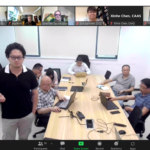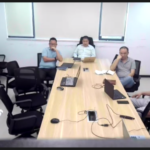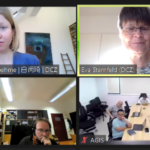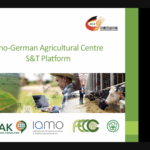On 11 April 2022, German and Chinese scholars in the fields of biochemistry, genetics and molecular biology came together for a third successful online workshop within the framework of the Exchange Forum on Sino-German Collaboration in Agricultural Sciences. Hosted by the Agricultural Genomics Institute Shenzhen (AGIS) of the Chinese Academy of Agricultural Sciences (CAAS) and co-organized by the S&T Platform of the Sino-German Agricultural Centre (DCZ) and the Department for International Cooperation of CAAS, the workshop focused on opportunities for Sino-German cooperation in agricultural genomics and biotechnology and their application for improved plant and animal breeding.
The workshop followed two earlier Exchange Forum events on agricultural information technology and agricultural product quality and safety, held as online workshops in April and September 2021, respectively. Since its inception in 2021, the Exchange Forum has sought to foster agricultural cooperation projects between researchers from Germany and China by identifying and matching mutually beneficial, cutting-edge ag science research conducted in both countries.
Participating institutions from China included the Agricultural Genomics Institute Shenzhen (AGIS), an agricultural genomics, biology and molecular breeding research institution, as well as Guangdong Academy of Agricultural Sciences (GAAS). On the German side, researchers from Justus Liebig University Giessen (JLU), Max Planck Institute for Chemical Ecology, Humboldt University Berlin, Julius Kühn Institute (JKI), University of Heidelberg, Georg August University Göttingen, and Research Institute for Farm Animal Biology (FBN) joined the event.
Dr. CHEN Tianjin, head of the Department for International Cooperation at CAAS, gave the opening and closing remarks and provided participants with an overview of current funding opportunities for Sino-German agricultural research projects. Next to research grants provided by the Sino-German Center for Research Promotion, researchers should consider the Horizon Europe Program as an additional source of funding, Dr. CHEN informed the workshop participants.
Following a short introduction of their respective home institutions, Dr. QIAO Yang, International Cooperation Manager at AGIS, and Dr. Eva Sternfeld, Head of Science Dialogue and S&T Platform at DCZ, then jointly led participants through the workshop program. In six panels, each matching a German and a Chinese research institution, workshop participants had the opportunity to present their research institutions and current projects to their counterparts and explore opportunities for future collaboration.
Below you will find a short summary of the topics discussed and the participating institutions. For more information or to contact the researchers involved, please send your enquiry to DCZ: m.boehme[at]iakleipzig.de.
Topics for potential collaboration
Panel 1: Biocontrol technologies targeting invasive species
Dr. LIU Conghui from AGIS and Prof. Marc Schetelig from the Institute of Insect Biotechnology at JLU Giessen introduced their joint research on prevention and control of invasive species in agriculture, using transgenic and non-transgenic control systems as well as genome sequencing technology. In 2020, the teams from both institutions successfully applied for a three-year Sino-German mobility grant from the National Natural Science Foundation of China (NSFC) and Deutsche Forschungsgemeinschaft (DFG), resulting in a number of joint publications and online exchanges. While it will be imperative for current pandemic-related travel restrictions to ease for the research collaboration to achieve its full potential, Marc Schetelig also stressed the long history of fruitful cooperation between JLU and CAAS and highlighted opportunities for future cooperation within the framework of the Horizon Europe funding scheme and the EU’s “farm-to-fork” strategy.
Panel 2: Plant natural product metabolism and plant microbiota metagenome
The second panel addressed biosynthetic pathways in living organisms with a view towards chemical plant defenses against insect herbivores. While Prof. LI Wei from AGIS presented the latest findings of his research group using OMICS approaches to elucidate the biosynthesis pathways of plant specialized metabolism in traditional Chinese medicinal plants, Prof. Jonathan Gershenzon from Max Planck Institute for Chemical Ecology shared insights from his research on defense metabolites in key agricultural crops and forestry systems. The research, Prof. Gershenzon stressed, might also have implications for protecting crops from fall army worm, a pest that has challenged agricultural production in China in recent years. The panel was completed by a presentation by Prof. Bernhard Grimm from the Department of Plant Physiology at Humboldt University Berlin, presenting research on the mechanisms that modulate metabolic activities and the organization of tetrapyrrole biosynthesis pathways.
Panel 3: Grapevine genomics and breeding
Prof. ZHOU Yongfeng from AGIS presented his lab’s research on population genomics of crops, using OMICS approaches in grapevine genomic breeding. In his presentation, Dr. Zhou highlighted the growing economic and agriculture significance of grapes production against a backdrop of diversifying diets in China. Prof. Reinhard Töpfer and his colleague Dr. Oliver Trapp from JKI, Institute for Grapevine Breeding introduced the institute’s activities in grapevine breeding and the collection of genetic resources to improve plant resistance to pests, rising temperatures, and extreme weather events.
Panel 4: Plant hormone and vascular system development
Panel 4 focused on the manipulation of hormone and stem cell systems to enhance plant development. Prof. WANG Quan, head of AGIS’ Super Rice Germplasm Innovation Team, gave an overview of his lab’s research on rice development and the use of plant hormone regulation to improve rice shoot architecture and root morphogenesis in high-yield rice breeding. Prof. Thomas Greb, head of the research group for Developmental Physiology at the Centre for Organismal Studies (COS) at University of Heidelberg shared insights into his research on the development of vessel systems in plants that enhance water carrying capacity and robustness against drought.
Panel 5: Variations in maize populations
An expert in molecular biology and whole-genome breeding, Dr. WANG LI from AGIS elaborated on how selection and demographic dynamics affect the genetic diversity of maize crops in the process of domestication, expansion, and improvement. In her presentation, Prof. WANG highlighted the implications of her research for the molecular breeding of improved maize traits. The panel was complemented by a presentation from Prof. Timothy Beissinger from Department of Crop Sciences, Center for Integrated Breeding Research, Georg August University Göttingen on the use of quantitative and population genetics to study the evolutionary development of phenotypes in agricultural crops, particularly maize, using these sets of information for plant improvement.
Panel 6: Nutritional regulation in pig breeding
The closing panel shifted the focus from plant to animal breeding. Dr. YANG Xuefen from Guangdong Academy of Agricultural Sciences (GAAS), Institute of Animal Science, shared research on swine nutrition and precision feeding developed at GAAS. The focus, she explained, is on designing nutritional strategies that improve gut health, animal metabolism, and meat quality. Finally, her counterpart Dr. Quentin Sciascia from the Institute of Nutritional Physiology, Research Institute for Farm Animal Biology (FBN) presented complementary research on metabolic conversion of nutrients in pigs, highlighting his group’s work on developing animal-friendly nutrition that simultaneously conserves natural resources and reduces emissions from farm animals.
More to come
We will continue our Exchange Forum series throughout 2022 to meet strong demand from both the German and Chinese agricultural science community. Further workshops will take place as online or hybrid events. Check in with us for more information!








